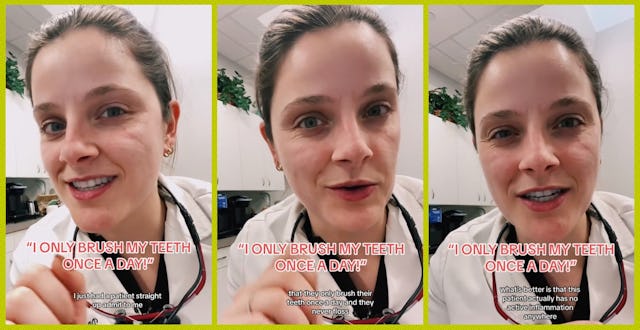PSA: Genetics Play A Big Part In Dental Health, Says TikTok Dentist
You could be the best brusher ever and still get cavities.

If a dentist has ever shamed you for having cavities, you know how sh*tty it feels. But unlike the shame-y dentists out there, one dental pro on TikTok understands. In fact, she has a message for anyone out there who has ever felt judged: You could be doing everything right and still have cavities since genetics (and a host of other factors) play a considerable part in oral health.
"I just had a patient straight-up admit to me that they only brush their teeth once a day, and they never floss," shares Dr. Ashley Brede Ciapciak, a Boston-based dentist (@drciapciak). "What's better is that this patient actually has no active inflammation anywhere. So, she was pretty confused when I said, 'You look exceptionally healthy.'"
Ciapciak continues, emphasizing the patient's shocking results: "Despite how little this patient brushes or flosses, her gum tissue still looks really outstanding. No gingivitis. No periodontitis. No active cavities."
So, yeah, you might be brushing and flossing every day like you're supposed to and still have gum disease. Or you could be like Ciapciak's genetically blessed patient and brush and floss as little as the contestants on Survivor yet maintain the pearliest whites.
Some people, Ciapciak explains, are just prone to good (or terrible) health, often despite the choices they make. She compares it to working out, pointing out that some people work out five times a week and, not surprisingly, are very healthy. But some people might only go to the gym once a month and be just as healthy.
"Both cavities and gum disease are a multifactorial situation," she explains, "so brushing and flossing isn't the only thing that affects that equation."
In the video's caption, Ciapciak broke down the oh-so-many factors in oral health.
"Oral microbiome, genetics, oral pH, diet, medications, systemic conditions, smoking, tooth morphology, and mouth breathing are just some of many additional things to consider when we look at your risk factors for cavities or gum disease," she wrote. "Your brushing and flossing routine is an important part of the equation but definitely not the *only* thing to consider."
Her comments section backed her up with real-life anecdotes.
"This is my husband. He brushes once a day, no cavities. But I brush twice a day. Usually floss. I have had so many cavities. It's def genetics," commented Gabi A.
"I like to tell patients that gum disease/cavities are like acne… you can never wash your face and have no acne or always wash and have huge breakouts!" wrote Alyssa.
"Sometimes I skip brushing because of ADHD, and I eat lots of sugar, but I've never had a cavity and the dentist always says my teeth are healthy 😂," wrote Gay Engineer.
"I brush and floss every day yet always have cavities 😭 my brother and dad are the same," commented Amanda.
"Honestly, sometimes once a day is the best someone can do, and that's OK. So it's good to hear this additional info," wrote Gatogremlins.
Still feel like you need to "do better?" Understandable. While genetics and so many other things play a part in oral health, you should still take brushing and flossing seriously. As Ciapciak gently reminds commenters, sometimes subpar oral hygiene habits catch up to you in the long run — even if you have genetics on your side.
But the next time a dentist shames you for cavities, remember that brushing and flossing are only part of the story. Other factors that affect your teeth include the food you eat, the medicines you take, the products you use (to a lesser extent), and the medical maintenance you're able to receive. And, let's face it, that last one is pretty f*cking hard when your health insurance doesn't cover your teeth, and out-of-pocket dental care or private dental insurance is expensive.
Finally, for anyone who needs to hear it, personal care (oral hygiene, cleanliness, etc) is not a moral issue. Just because your teeth are perfect or you brush and floss twice a day doesn't mean you're better than anyone else.